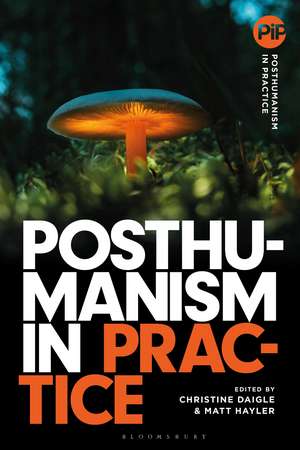Posthumanism in Practice: Posthumanism in Practice
Editat de Christine Daigle, Matthew Hayleren Limba Engleză Paperback – 21 aug 2024
| Toate formatele și edițiile | Preț | Express |
|---|---|---|
| Paperback (1) | 192.01 lei 3-5 săpt. | +72.02 lei 10-14 zile |
| Bloomsbury Publishing – 21 aug 2024 | 192.01 lei 3-5 săpt. | +72.02 lei 10-14 zile |
| Hardback (1) | 511.14 lei 6-8 săpt. | |
| Bloomsbury Publishing – 8 feb 2023 | 511.14 lei 6-8 săpt. |
Preț: 192.01 lei
Preț vechi: 249.72 lei
-23% Nou
Puncte Express: 288
Preț estimativ în valută:
36.74€ • 38.14$ • 30.64£
36.74€ • 38.14$ • 30.64£
Carte disponibilă
Livrare economică 01-15 martie
Livrare express 18-22 februarie pentru 82.01 lei
Preluare comenzi: 021 569.72.76
Specificații
ISBN-13: 9781350293847
ISBN-10: 1350293849
Pagini: 264
Dimensiuni: 156 x 234 x 25 mm
Greutate: 0.37 kg
Editura: Bloomsbury Publishing
Colecția Bloomsbury Academic
Seria Posthumanism in Practice
Locul publicării:London, United Kingdom
ISBN-10: 1350293849
Pagini: 264
Dimensiuni: 156 x 234 x 25 mm
Greutate: 0.37 kg
Editura: Bloomsbury Publishing
Colecția Bloomsbury Academic
Seria Posthumanism in Practice
Locul publicării:London, United Kingdom
Caracteristici
The first book to forefront posthumanism as an applied field of study. One that can be used for practice whether that be in terms of art, teaching, writing etc.
Notă biografică
Christine Daigle is Director of the Posthumanism Research Institute at Brock University, Canada. Her work investigates ontological and ethical questions related to posthuman subjectivity and the environmental posthumanities. She currently collaborates with a theatre company on a Social Sciences and Humanities Research Council of Canada (SSHRC) funded project exploring the posthuman of tomorrow via creative practice. Matt Hayler is Senior Lecturer in Contemporary Literature and Digital Cultures at the University of Birmingham, UK. He has taught courses related to trans- and posthumanism and digital cultures for the last 10 years. His research has looked at posthumanist approaches in the philosophy of technology (Challenging the Phenomena of Technology, 2015) and the production and reception of digital texts (Ambient Literature, 2020), and he now focuses on the meeting points of posthumanism, weird fiction, human enhancement, disability studies, and digital cultures.
Cuprins
Introduction: Theory into Praxis, Matt Hayler (University of Birmingham, UK), Christine Daigle (Brock University, Canada)1. Engineering the Posthuman: Conceiving Handedness and Constructing Disabled Prostheses, Stuart Murray (Leeds University, UK)2. Posthumanising Biomedicine: The Role of Microbioia in Parkinson Disease Research, Aaron Bradshaw (UCL, UK)3. Posthumanism and the Limits of Multispecies Relationality, Bryan Lim (Goldsmiths, University of London, UK)4. Alien Embodiment and Nomadic Subjectivity: A Speculative Report, Steve Klee and Kirsten McKenzie (University of Lincoln, UK)5. Sympoietic Art Practice with Plants: A Case for Posthuman Co-Expression, Lin Charlston (visual artist)6. Kneading Bodies, Madaleine Trigg (Massey University, New Zealand)7. Circus as Practices of Hope, Marie-Andrée Robitaille (Stockholm University of the Arts, Sweden)8. Posthumanism in Play: Entangled Subjects, Agentic Cutscenes, Vibrant Matter, and Species Hybridity, Poppy Wilde (Birmingham City University, UK)9. Posthumanist Interfaces: Developing New Conceptual Frameworks for Museum Practices in the Context of a Major Museum Technology Collection, Deborah Lawler-Dormer (Museum of Applied Arts and Sciences, Australia) and Christopher John Müller (Macquarie University, Australia)10. Affirming Future(s): Towards a Posthumanist Conservation in Practice, Hélia Marçal (UCL, UK) and Rebecca Gordon11. Water, Ice, and Dead 'Tadpoles': Discovering within Undecided Boundaries in Early Childhood Education for Sustainability Research, Debra Harwood (Brock University, Canada)12. Reflections On a Language Teacher Education Praxis from a Posthumanist Viewpoint, Laryssa Paulino de Queiroz Sousa and Rosane Rocha Pessoa (Federal University of Goiás, Brazil)13. Unlearning to Be Human? The Pedagogical Implications of 21st-Century Postanthropocentrism, Stefan Herbrechter (Heidelberg University, Germany)14. Posthumanism and Postdisciplinarity: Breaking Our Old Teaching and Research Habits, Christine Daigle (Brock University, Canada)
Recenzii
This book offers an essential overview of how posthuman perspectives are intervening in the sciences, in the arts, and in education. Daigle and Hayler brought together a beautiful collection of texts, that are urgent, lucidly written and accessible to everyone interested in exploring the consequences of this inclusive and diverse movement. It should be included in every course that aims to map how study the contemporary.
This transdisciplinary collection testifies to the rigour and ethical import of posthumanism. Traversing the humanities, social sciences, and sciences, Posthumanism in Practice is essential reading for all of us seeking methods, concepts, and creative new ways to bridge disciplines and to resist human exceptionalism in its many forms.
This transdisciplinary collection testifies to the rigour and ethical import of posthumanism. Traversing the humanities, social sciences, and sciences, Posthumanism in Practice is essential reading for all of us seeking methods, concepts, and creative new ways to bridge disciplines and to resist human exceptionalism in its many forms.


